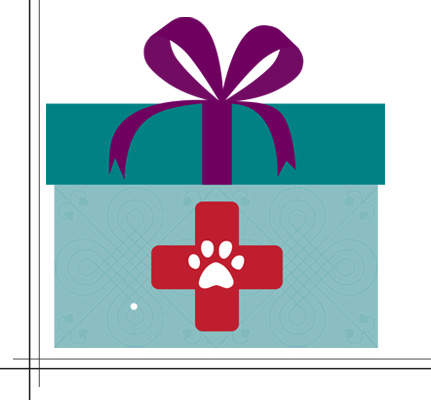
Supporting Every Aspect of Animal Care
By Jamie DePolo

By Jamie DePolo
What does it take for two people with no ties to the College of Veterinary Medicine, nor Michigan State University, to become long-term supporters of the College, and make gifts that cover tuition and fees for students in both the Doctor of Veterinary Medicine (DVM) and Veterinary Nursing Programs?
In the case of the couple who created the Vulcan Scholarship Programs, it started with the wonderful care that their first dog, a Labrador Retriever, received when they were graduate students in Ann Arbor.
“Our first vets were all MSU graduates,” they recall, “and they gave our dog such wonderful care. They referred us to an orthopedist at the MSU College of Veterinary Medicine because he had hip dysplasia. He was only two, and we thought it was going to be the worst. But the orthopedist helped him so much and he lived to be 14 and had a wonderfully comfortable life. When our dog did die, our vets in Ann Arbor made a contribution to the College in his honor, which was so sweet, and we thought, ‘Maybe that’s something that we should support.’”
These donors prefer to remain anonymous, but did share that the name “Vulcan” comes from Roman mythology, not Star Trek.
“We’re probably the only two people in the world who have never watched Star Trek,” they explain. “And we didn’t understand why people were always giggling when they heard the name of our Programs.”
The couple’s most recent gift covers full tuition and fees for three MSU Veterinary Nursing students working toward their bachelor of science degrees. Two scholarships will be awarded for the 2021-22 academic year, and a third for the following year.
“All our dogs have received such good care from veterinary nurses,” the couple says. “Veterinary nurses are critical to the care of animals. We’ve also received some of the best information on how and when to give medicine or how to care for our dogs after surgery from the nurses. They’re involved in just about every aspect of animal care.”
According to the donors, the goal of their scholarship is to enable outstanding Veterinary Nursing students, who ordinarily might be too busy working to afford tuition, to participate in research and other academic activities.
“We want to support students and help attract the best students to the College,” they say. Previously, the couple created the Vulcan Scholars Program, which helps support students in the College’s Dual-Degree Program. This Program allows students to earn their DVM and PhD degrees simultaneously. The Vulcan Scholars Program covers tuition and fees, which eases some of the loan stress that affects nearly all veterinary students, and allows students to take advantage of off-campus specialty externships and other opportunities.
Alumna and Vulcan Scholarship recipient Kyra Heirich (DVM ’20) says the funding allowed her to enhance her education through a veterinary acupuncture training course, a rural-area veterinary service trip to the San Carlos Native American Reservation in Arizona, and a high-quality, high-volume spay/neuter training course from the American Society for the Prevention of Cruelty to Animals in North Carolina.
“I can’t thank my scholarship donors enough for the opportunities they’ve provided me,” Heirich says. “I was able to explore a huge range of diverse interests, none of which would have been possible without my scholarship funding.”
